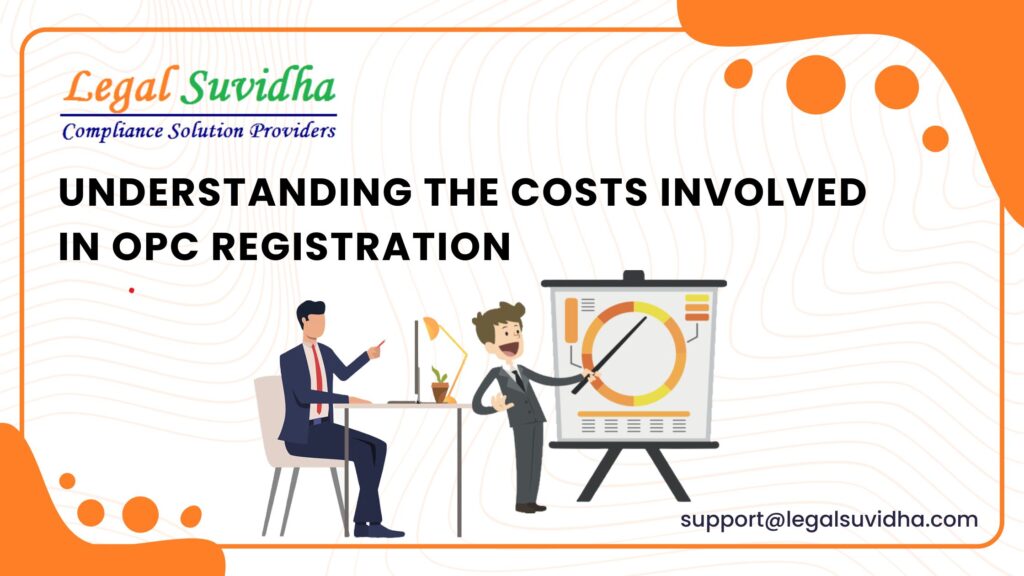Understanding the Costs Involved in OPC Registration
1. Introduction
Incorporating a One Person Company (OPC) is an attractive option for solo entrepreneurs looking to start a business with limited liability protection. OPCs offer the benefits of a private limited company while being managed by a single individual. However, before diving into the registration process, it’s crucial to understand the costs involved. This guide will provide a comprehensive breakdown of these costs and offer tips to manage them effectively.
2. OPC Registration Costs Breakdown
2.1 Government Fees
The government fees for OPC registration include several components:
- Digital Signature Certificate (DSC): To file documents online, a DSC is required. The cost ranges from ₹500 to ₹2,000, depending on the service provider and validity period.
- Director Identification Number (DIN): Each director must obtain a DIN. While the cost for DIN is generally nominal, it can be around ₹500 per DIN.
- Name Reservation: The cost for reserving a company name through the RUN (Reserve Unique Name) service is approximately ₹1,000.
- Incorporation Fees: This fee is based on the authorized capital of the company. For authorized capital up to ₹1 lakh, the fee is ₹2,000, while it increases with higher capital.
2.2 Professional Fees
Engaging professionals for OPC registration involves:
- Legal and Consultancy Fees: Hiring a lawyer or consultant to guide you through the registration process can cost between ₹5,000 to ₹15,000.
- Document Drafting and Filing: Preparing and filing necessary documents like the Memorandum of Association (MOA) and Articles of Association (AOA) can add another ₹2,000 to ₹5,000.
- Compliance Costs: Ensuring compliance with legal requirements might involve additional fees for services such as tax registration or GST.
2.3 Additional Costs
There are other costs to consider:
- Registered Office Address: An OPC must have a registered office. Renting an office space or using a virtual office service can cost from ₹5,000 to ₹15,000 annually.
- Stamp Duty: Stamp duty varies by state but generally falls between ₹500 to ₹5,000 depending on the authorized capital.
3. Comparative Analysis
3.1 OPC vs. Pvt Ltd Company Costs
When comparing OPC registration with a Private Limited Company (Pvt Ltd), the initial registration costs are relatively similar. However, ongoing compliance costs for Pvt Ltd companies might be higher due to more complex regulatory requirements and annual filings.
3.2 OPC vs. LLP Costs
Compared to Limited Liability Partnerships (LLPs), OPC registration costs are generally higher due to the necessity of certain statutory requirements. LLPs have a simpler compliance structure, which may result in lower ongoing costs.
4. Hidden Costs and Considerations
Several hidden costs can affect the overall expenditure:
- Amendments and Corrections: Any amendments to documents or corrections after filing can incur additional fees.
- Annual Compliance Costs: Regular compliance with regulations such as annual returns and audits can add to the cost.
- Legal Disputes: Unexpected legal issues might arise, leading to additional expenses.
To manage these costs, it’s important to plan for contingencies and consult with professionals early in the process.
5. Cost-Saving Tips
Here are some tips to reduce OPC registration costs:
- Use Online Services: Many government services are available online, which can save time and money compared to manual processing.
- Compare Service Providers: Obtain quotes from multiple consultants and service providers to find the most cost-effective option.
- DIY Filing: If you are familiar with the registration process, you might consider filing some documents yourself to save on professional fees.
6. Conclusion
Understanding the costs involved in OPC registration is crucial for planning and budgeting. From government fees and professional charges to additional costs like office space and stamp duty, being aware of these expenses helps in making informed decisions. By following the tips provided, you can manage and potentially reduce the costs associated with OPC registration, setting a strong foundation for your business.
7. FAQs
What is the average cost of OPC registration in India?
Ans: The average cost ranges from ₹10,000 to ₹30,000, depending on factors like authorized capital and professional fees.
Are there any ongoing costs after OPC registration?
Ans: Yes, ongoing costs include annual compliance fees, legal and audit expenses, and office maintenance.
What are the initial costs of OPC registration?
Ans: Initial costs include government fees for obtaining DSC, DIN, name reservation, incorporation fees, professional fees for legal and consultancy services, and additional costs for office space and stamp duty.
What are the recurring costs for maintaining an OPC?
Ans: Recurring costs include annual compliance fees, such as filing annual returns and financial statements, audit fees, and costs associated with maintaining a registered office.
How can I avoid hidden costs during OPC registration?
Ans: Plan for contingencies, consult with experienced professionals, and review all costs before proceeding.
What are the costs associated with obtaining a Digital Signature Certificate (DSC) and Director Identification Number (DIN)?
Ans: DSC costs generally range from ₹500 to ₹2,000, and obtaining a DIN typically costs around ₹500 per DIN.
What are the costs associated with the registered office address for an OPC?
Ans: The cost of a registered office address can range from ₹5,000 to ₹15,000 annually, depending on whether you choose a physical office space or a virtual office service.
Are there any hidden costs involved in OPC registration?
Ans: Hidden costs can include fees for document amendments, additional legal services, and unexpected compliance expenses.
What are the key factors that influence the overall cost of OPC registration?
Ans: Key factors include authorized capital, choice of professional services, location of the registered office, and additional compliance requirements.
How long does it take to complete the OPC registration process?
Ans: The registration process typically takes between 15 to 30 days, depending on document submission efficiency and approval from regulatory authorities.










